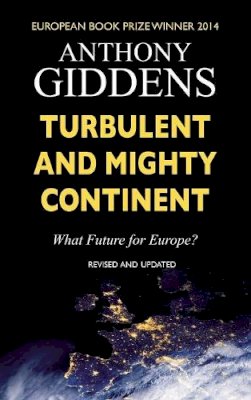
Stock image for illustration purposes only - book cover, edition or condition may vary.
Turbulent and Mighty Continent: What Future for Europe
Anthony Giddens
€ 72.30
FREE Delivery in Ireland
Description for Turbulent and Mighty Continent: What Future for Europe
Hardcover. Winner of the 2014 European Book Prize. A "United States of Europe", Winston Churchill proposed in 1946, could "as if by a miracle transform" that "turbulent and mighty continent". "In this way only", he continued, "will hundreds of millions of toilers be able to regain the simple joys and hopes which make life worth living". Num Pages: 224 pages, illustrations (black and white). BIC Classification: 1D; JPS; KCLT. Category: (P) Professional & Vocational. Dimension: 159 x 230 x 25. Weight in Grams: 516.
Winner of the 2014 European Book Prize.
A "United States of Europe", Winston Churchill proposed in 1946, could "as if by a miracle transform" that "turbulent and mighty continent". "In this way only", he continued, "will hundreds of millions of toilers be able to regain the simple joys and hopes which make life worth living".
Today, nearly seventy years later, over 500 million people live in the member states of the European Union – a greater number than in any other political community save for China and India. The currency of the Union, the euro, is used in economic transactions world-wide. Yet the EU is mired in the greatest crisis of its history, one that threatens its very existence as an entity able to have an impact upon world affairs. Europe no longer seems so mighty, instead but faces the threat of becoming an irrelevant backwater or, worse, once again the scene of turbulent conflicts. Divisions are arising all over Europe, while the popularity of the Union sinks. How can this situation be turned around?
Now published as a revised and updated paperback that takes account of the May 2014 elections to the European Parliament, Turbulent and Mighty Continent makes a powerful case for a far-reaching and fundamental renewal of the European project as a whole.
A "United States of Europe", Winston Churchill proposed in 1946, could "as if by a miracle transform" that "turbulent and mighty continent". "In this way only", he continued, "will hundreds of millions of toilers be able to regain the simple joys and hopes which make life worth living".
Today, nearly seventy years later, over 500 million people live in the member states of the European Union – a greater number than in any other political community save for China and India. The currency of the Union, the euro, is used in economic transactions world-wide. Yet the EU is mired in the greatest crisis of its history, one that threatens its very existence as an entity able to have an impact upon world affairs. Europe no longer seems so mighty, instead but faces the threat of becoming an irrelevant backwater or, worse, once again the scene of turbulent conflicts. Divisions are arising all over Europe, while the popularity of the Union sinks. How can this situation be turned around?
Now published as a revised and updated paperback that takes account of the May 2014 elections to the European Parliament, Turbulent and Mighty Continent makes a powerful case for a far-reaching and fundamental renewal of the European project as a whole.
Product Details
Publisher
Polity
Number of pages
224
Format
Hardback
Publication date
2013
Condition
New
Weight
515g
Number of Pages
224
Place of Publication
Oxford, United Kingdom
ISBN
9780745680965
SKU
V9780745680965
Shipping Time
Usually ships in 7 to 11 working days
Ref
99-1
About Anthony Giddens
Anthony Giddens is former Director of the London School of Economics, Life Fellow of King’s College, Cambridge, and Member of the House of Lords, UK.
Reviews for Turbulent and Mighty Continent: What Future for Europe
Winner of the European Book Prize for Non-Fiction "Rich in insights on conceptualising problems and identifying solutions." —LSE Review of Books "A significant intervention into the debate about Europe's future." —Gerhard Schröder, former Chancellor of Germany "An indispensable book at a time when clear thinking about the EU is vital. Deserves to be actively debated across Europe at such a critical juncture in the continent’s history." —Javier Solana, former EU High Representative for Foreign Affairs and Security Policy and Secretary-General of NATO "In the 1980s the famous Cecchini Report played a crucial role in fostering the single currency. I expect this book by Tony Giddens to play a similar role in the creation of the more integrated Europe essential to us all twenty five years later." —Giuliano Amato, former Prime Minister of Italy "A great book bout the possibilities for European social democracy in the modern world." —Progress Online "From the perspective of a new entrant country like Romania, Giddens' views are as relevant as they are to the founding member states. A must-read for all who are concerned about Europe's future, whatever shade of opinion they may hold." —Ana Birchall, MP and Member of the European Affairs Commission, Romanian Parliament "A must-read from one of the leading thinkers of our time, for all who want the European Project to adapt and progress, and preferably do so with the United Kingdom as a committed member of a stronger but also more flexible Union." —Kemal Dervis, Vice-President for Global Economics at the Brookings Institution and former Turkish Minister of Economic Affairs "... Giddens succeeds in cutting through much of the turgid intramural debate on Europe to offer a clear diagnosis of the European Union's dilemma, and a powerful argument in its favour." —Survival: Global Politics and Strategy "The author raises a wide range of subjects: global warming, energy consumption, immigration, digital economy, diplomacy. His viewpoints are clear. This oeuvre offers a logical and thought-provoking perspective." —Politique Etrangère "This latest work by Anthony Giddens is a brilliant and subtle contribution to the future of Europe." —Europe's World "The book provides a comprehensive and relatively accessible overview of the diverse problems facing contemporary Europe." —Political Studies Review
